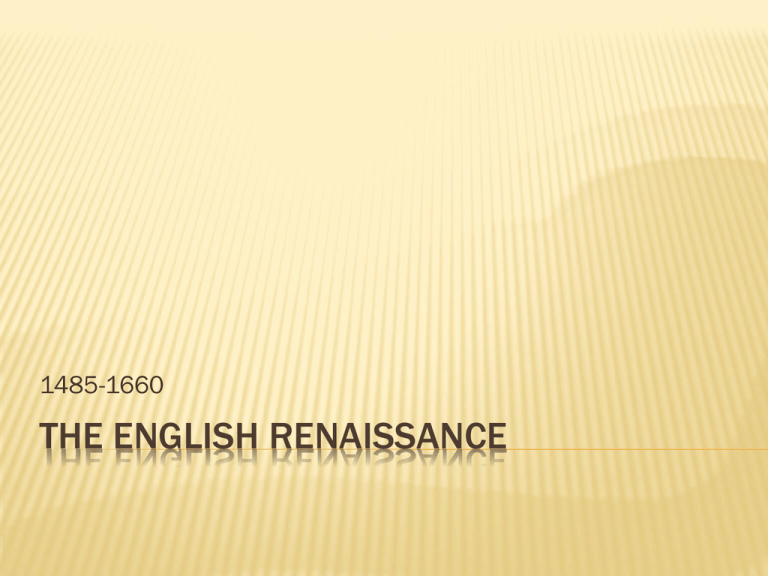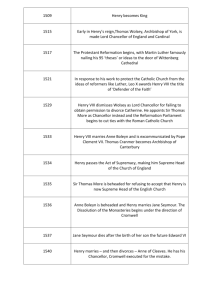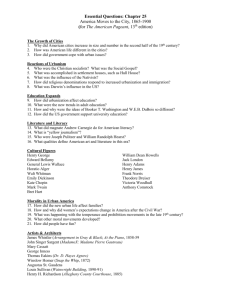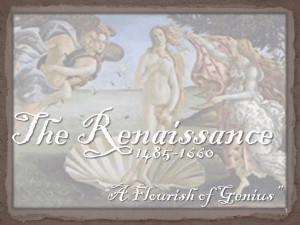Renaissance Notes
advertisement

1485-1660 THE ENGLISH RENAISSANCE THE MONARCHY AND THE CHURCH The Tudors: 1485- Henry Tudor (Henry VII) took the throne Shrewd leader Involved in commerce Arranged for his son, Arthur, to marry a Spanish Princess. Her name was Catherine of Aragon. When Arthur died, Henry VII arranged for his second son (whose name is also Henry) to marry Catherine. When Henry VII died, his son Henry VIII took over the throne of England. THE MONARCHY AND THE CHURCH The Tudors Henry VIII Wanted a son to carry on the family name Catherine (his first wife) gave him a daughter so he divorced her. He then married Catherine’s court attendant Anne Boleyn. She also gave him a daughter. Henry VIII had Anne Boleyn beheaded. All in all he had 6 wives. Divorced – beheaded – died – repeat. THE MONARCHY AND THE CHURCH Henry VIII Only had one son (Edward VI). Edward was frail and sickly. He took over the throne when Henry VIII died but his health only allowed him to rule for six years. When Edward died, his half sister Mary (daughter of Henry’s first wife) took over. She was a cruel ruler and was given the name of Bloody Mary. When Mary died in 1558, her half sister (daughter of Henry and Anne Boleyn) took over the throne. Her Name was Elizabeth and she was known as one of the best monarchs in England’s history. THE PROTESTANT REFORMATION 1517 – Martin Luther nailed his 95 theses (arguments) to the church door. Wanted church reform Eventually led to reformed Protestant churches THE ELIZABETHAN ERA Elizabeth I was the unwanted daughter of Henry VIII and Anne Boleyn. Able monarch Consummate politician Sensitive to public opinion but respectful of parliament Ended Spanish alliance Ordered her cousin, Mary Queen of Scots, to be beheaded. Spain’s Philip II sent an Armada to retaliate against Elizabeth. A huge storm came and decimated the Spanish Armada before it reached the coast of England THE RISE OF THE STUARTS When Elizabeth died in 1603, the Tudor dynasty came to an end. Her cousin, James I (son of Mary Stuart) took over the throne of England. Charles I (son of James I) took over after his father died and made a mess out of things. Dismissed parliament Took strong measures against his enemies Eventually plunged his country into a civil war DEFEAT OF THE MONARCHY Charles I and the Royalists were eventually defeated by General Oliver Cromwell. Parliament establish a commonwealth with Cromwell at the head. When Cromwell died in 1658 his son interested the title but not his father’s ability to rule. In 1660, Parliament invited Charles II to return from exile and rule as king. His reign ushered in The Restoration THE RENAISSANCE Literally means rebirth Surge of creative energy Delighted in arts and literature, beauty of nature, exploration Time of Shakespeare, Galileo, and Columbus Gutenberg’s printing press James I commissioned the first English translation of the Bible (The King James version) PASTORAL POEMS AND SONNETS Pastorals portray shepherds and rustic life, usually in an idealized manner. Elizabethans admired intricacy and artifice The sonnet is a 14 line verse poem, often published in sequences SHAKESPEAREAN DRAMA Elizabethan drama came from three sources: 1. 2. 3. Medieval plays 16th century interludes Greek and Latin classics Plays focused on human complexities rather than religious themes The Globe was the most successful of many English theaters Shakespeare contributed more than 37 plays Marlowe and Jonson were popular playwrights After 1649, Puritans closed the theaters. THE RISE OF HUMANISM Humanists were so called because they studied the humanities (art, literature, philosophy, and history). Christian humanists criticized society. A reverence for the classics and pride in the English language led to distinguished translations. Humanists disagreed on religious issues. SPIRITUAL WRITINGS Early efforts to translate the Bible were censured by the church The King James Bible was created by a committee of scholars; it became the most influential English translation. Milton’s Paradise Lost is based on a biblical allegory of the journeyed to the afterlife. METAPHYSICAL AND CAVALIER POETS Ben Jonson, a boisterous man and an accomplished poet, inspired later poets, called “sons of Ben.” These poets were known as Cavaliers because they took the side of Charles I and his Royalist cavaliers. Cavalier poetry was charming and witty, dealing with themes of love, war, and carpe diem. John Donne wrote metaphysical poetry – poems characterized by themes of love, death, and religious devotion. Metaphysical poets used elaborate metaphors to explore life’s complexities.







